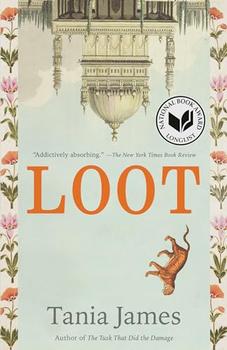Summary | Excerpt | Reading Guide | Reviews | Beyond the Book | Readalikes | Genres & Themes | Author Bio

A Novel
by Tania JamesSRIRANGAPATNA, MYSORE
1794
I
On the day he is taken from his family, Abbas is carving a peacock into a cabinet door. He drives his gouge tip through the rosewood, adjusting the pressure with his pointer finger. Grooves deepen, a beak appears. He moves on to sculpt feathers, stacked like scales. He excels at this task and has never been so bored in his life. Seated nearby on coir mats are his father and two older brothers, Junaid and Farooq. With a post braced against the inside of his knee, Junaid knocks out nuggets of unwanted wood with the tak-tak! of his mallet and chisel. Farooq sketches a pair of peacocks for a headboard. Their father sands a finished post, stopping every so often to shoot Abbas a warning look.
"No more of your toys," his father has told him in private. "Beds and cabinets, that's it. The toys only bring trouble."
Pausing to arch his back, Abbas is distracted by a pigeon fluttering down from a roof across the lane. Curious, isn't it, the way birds bob their heads while they walk but never while they fly? (Abbas finds it curious, though some might say curiosity is exactly his problem.) He wonders if it's something to do with a connective mechanism between the leg and the neck. And, he wonders, if one were to construct a mechanical pigeon, how might the head be engineered to jerk with every step?
Then he recalls something a friend once told him.
Ask too many questions and next thing you know, you're the one being questioned.
Abbas is trading out one gouge for another when a man appears at the threshold, holding a bayonet that surpasses him in height. By the tiger-striped sleeves, Abbas knows him to be one of Tipu Sultan's royal guards.
"Are you Abbas, son of Yusuf Muhammad?" the guard says. "Who's asking?" says Abbas, not as coolly as he'd like.
The guard takes a breath. "Tipu Sultan Fath Ali Khan, the Tiger of Mysore, the Padshah of Patan, Breaker of Colonel Baillie, and God-Given Overseer of the State—" Across the lane, a lathe shrieks to a stop. People lift their heads from their work. "—has summoned Abbas, son of Yusuf Muhammad, to the Summer Palace."
"Outside the city walls?" asks Abbas, who has never in his life been outside the city walls.
"Is there another Summer Palace?" says the guard. "Get up!" Abbas stands, his legs tingling with pins and needles. He won-
ders if he will faint.
"Wait," says Yusuf Muhammad, following Abbas and the guard into the lane. "He's only seventeen. Let me answer for his crimes."
"What crimes?" says Junaid. "What is all this about?"
"Did I say crimes? I meant misdeeds." Yusuf Muhammad drops his voice low. "Is this about the eunuch?"
"Eunuch?" says the guard, affronted.
"I can speak for myself," Abbas says quickly. He follows the guard's instruction to walk three paces ahead but does not grant his family a backward glance, knowing it is too late to explain himself or ask their forgiveness.
It is said that in Srirangapatna, the spies outnumber the people. There are the spymasters and couriers of Tipu Sultan, ferrying messages to and from the capital city, and then there are the spies of Tipu's enemies—the Nizam of Hyderabad, the Nairs of Malabar, the Marathas, the English, the Mangalorean Catholics. (Do not even get Tipu started on those Catholics; mention the Catholics in his presence and he will have a gold-plated fit.) Tipu has spies in the courts of his friends and enemies, too, constantly sending him intelligence, which, problematically, only excites the thirst for more intelligence.
But these are problematic times.
Tipu's kingdom barely survived the most recent war with the English, and talk of still another is always on the horizon. The people never know who is coming from where to take what from whom. All they can do is submit to power each time it changes hands, each time the powerful decide to redecorate. This one wants a new calendar. That one wants his face struck on a coin. With every alteration, large and small, the ground unfirms itself beneath their feet, making it nearly impossible for anyone to leave a lasting mark.
Excerpted from Loot by Tania James. Copyright © 2023 by Tania James. Excerpted by permission of Knopf. All rights reserved. No part of this excerpt may be reproduced or reprinted without permission in writing from the publisher.
In order to become the master, the politician poses as the servant
Click Here to find out who said this, as well as discovering other famous literary quotes!
Your guide toexceptional books
BookBrowse seeks out and recommends the best in contemporary fiction and nonfiction—books that not only engage and entertain but also deepen our understanding of ourselves and the world around us.